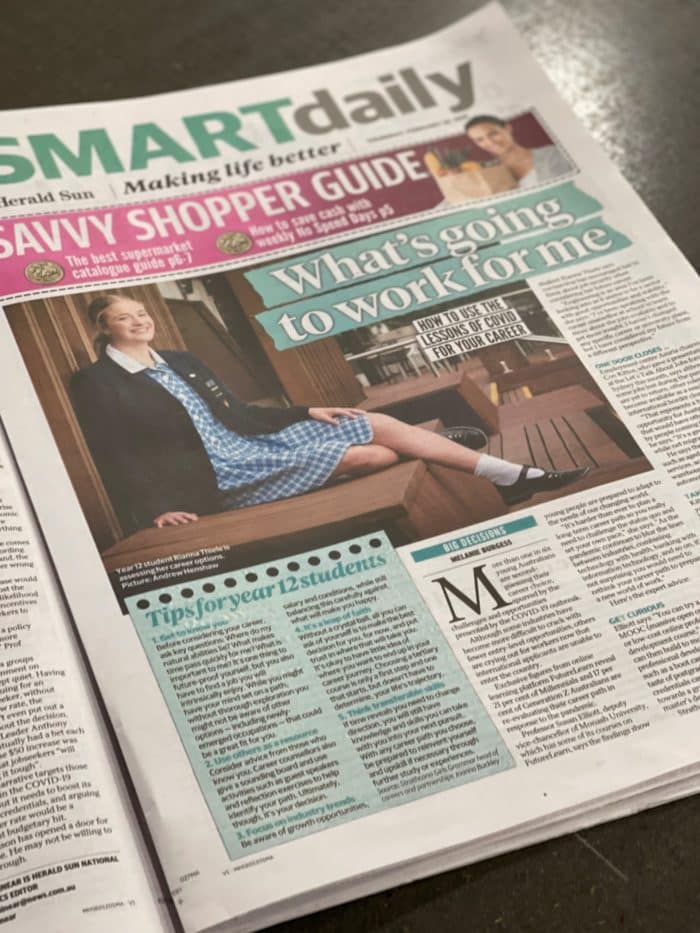In the Media: Herald Sun- Smart Daily, 25 Feb 2021, p. 27. Gold Coast Bulletin, The Advertiser, Geelong Advertiser, Broome Advertiser, Ntnews.com.au, Townsville Bulletin, The Mercury, Cairns Post, Herald Sun Online, The Daily Telegraph Online and The Courier-Mail
More than one in six young Australians are second guessing their career choice, spurred by the challenges and opportunities presented by the COVID-19 outbreak.
Although some industries have become more difficult to crack with fewer entry-level opportunities, others are crying out for workers now international applicants are unable to enter the country.
Exclusive figures from online learning platform FutureLearn reveal 21 per cent of Millennials and 17 per cent of Generation Z Australians are re-evaluating their career path in response to the pandemic.


Professor Susan Elliott, deputy vice-chancellor of Monash University, which has some of its courses on FutureLearn, says the findings show young people are prepared to adapt to the needs of our changing world.
“It’s harder than ever to plan a long-term career path so you really need to challenge the status quo and set your own pace,” she says.
“As the pandemic continues to blur the lines between industries, combining technology with health, banking with information technology, and so on, it’s not surprising you would need to rethink your career path to prepare for a new world of work.”
Here’s the expert advice:
“You can try a free MOOC (massive open online course) or low-cost online professional development course,” she says. “You can then build to more intensive professional development courses, such as a boot camp. Or if you want a taste of postgraduate study, micro-credentials can carve pathways towards a graduate certificate or master’s degree.”
Strathcona Girls Grammar year 12 student Rianna Thiele says coronavirus has encouraged her to think about job security when considering her future career.
“Engineering is an area I’ve been looking into as it seems to be a sector with good opportunities and stability,” she says.
“I’ve been speaking with the career counsellor at school to learn more about the jobs available and to get more insight. I haven’t changed any specific career or university plans, but I have considered my future from a different perspective.”


The FutureLearn statics follow findings from job site Indeed that 74 per cent of university graduates are considering either extending their studies, starting a new course, or switching streams because of lowered expectations of work prospects.
It is not all bad news though.
ONE DOOR CLOSES …
Employment centre Asuria chairman Con Kittos, who gave a presentation at the Let’s Talk About Jobs forum in Sydney this month, says although some jobs lost during the pandemic are yet to return, other roles have become available as a result of international border closures.
“Because immigration is frozen and we don’t have skilled workers coming into the country with visas, that represents a huge opportunity for Australians to fill roles that would have otherwise been taken by people coming into the country,” he says. “It’s a great time right now while net migration is negative.”
He says these roles are in areas such as aged care and community services, accommodation, nursing, warehouse storage and distribution, automotive trades and childcare.
TAKE ALMOST ANY JOB
Kittos advises young people to take any job they can and then progress.
“If you are in the market, you are earning an income and building experience and credibility with an employer – and that can only be better than being unemployed,” he says.
“Take a job, almost any job, so you get that experience. My other tip is (for jobseekers) to tell potential employers they may be eligible for government wage subsidies (because) not all employers are aware of that.”


Demographer and social researcher Mark McCrindle, who also spoke at Asuria’s Let’s Talk About Jobs forum, says that young people have a lot of the skills employers are after and the workforce needs.
“I saw a group of young people (at the forum) that had a learning attitude, they were action oriented and they were resilient based on their personal circumstances,” he says.
“My message to them was to continue to demonstrate that resilience because that is the stuff of success. We need people who can adapt quickly to circumstances and these people have digital skills, which is what’s required in a world where we connect and collaborate not just face-to-face but through digital tools.
“They are coming out (of study) with 21st century training and are at a point in their life where they have the flexibility to move or change and adjust. They are also able to connect across diversity and that is a key thing for our diverse nation and customer base.”


TIPS FOR YEAR 12 STUDENTS
From Strathcona Girls Grammar head of careers and partnerships Joanna Buckley
1. Get to know you
Before considering your career, ask key questions: Where do my natural abilities lie? What makes time pass quickly for me? What is important to me? It’s one thing to future-proof yourself, but you also have to find a job you will intrinsically enjoy. While you might have your mind set on a path, without thorough exploration you might not be aware of other options – including newly-emerged occupations – that could be a great fit for you.
2. Use others as a resource
Consider advice from those who know you. Career counsellors also give a sounding board and use activities such as guest speakers and reflection exercises to help identify your path. Ultimately, though, it’s your decision.
3. Focus on industry trends
Be aware of growth opportunities, salary and conditions, while still balancing this carefully against what will make you happy.
4. It’s a leap of faith
Without a crystal ball, all you can ask of yourself is to make the best decision for you, for now, and put trust in where that will take you. It’s okay to have little idea of where you want to end up in your career journey. Choosing a tertiary course is only a first step and one that starts, but doesn’t have to determine, your life’s trajectory.
5. Think transferable skills
If time reveals you need to change direction, you will still have knowledge and skills you can take with you into your next pursuit. With any career path you choose, be prepared to reinvent yourself and upskill if necessary through further study or experiences.
Originally published as Why more young Aussies are changing careers


